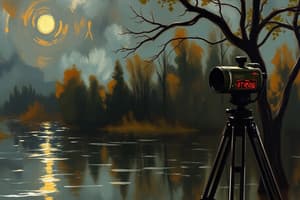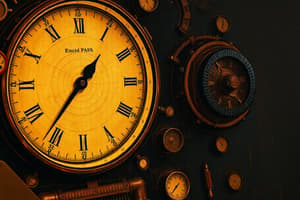Podcast
Questions and Answers
What is the purpose of measurement in the scientific realm?
What is the purpose of measurement in the scientific realm?
- To transform electrical signals into mechanical motion
- To convert physical quantities into electrical signals
- To detect and respond to physical stimuli
- To understand natural phenomena, validate theories, and develop new technologies (correct)
Which type of instrument converts one type of physical quantity into another?
Which type of instrument converts one type of physical quantity into another?
- Transducers (correct)
- Actuators
- Sensors
- Detectors
What is the primary function of sensors?
What is the primary function of sensors?
- To convert physical quantities into electrical signals
- To detect and respond to physical stimuli (correct)
- To transform electrical signals into mechanical motion
- To measure length and displacement
Which of the following best describes the measurement of length and displacement?
Which of the following best describes the measurement of length and displacement?
What is the purpose of a laser rangefinder?
What is the purpose of a laser rangefinder?
Which device is used to measure the specific gravity of a liquid?
Which device is used to measure the specific gravity of a liquid?
What is the function of a clock in time measurement?
What is the function of a clock in time measurement?
Which instrument measures temperature based on the voltage generated at the junction of two conductors with different coefficients of thermal expansion?
Which instrument measures temperature based on the voltage generated at the junction of two conductors with different coefficients of thermal expansion?
What does a barometer measure?
What does a barometer measure?
Which device is used to measure the wavelength distribution of light?
Which device is used to measure the wavelength distribution of light?
Flashcards are hidden until you start studying
Study Notes
Mastering the Art of Fundamental Measurement and Instrumentation: A Comprehensive Guide to Measurement Techniques
On a sunny Sunday, February 4th, 2024, we delve into the fascinating realm of fundamental measurement and instrumentation. This article will explore the world of measurement techniques, unraveling the complexities and providing insights into various methods that help us decode the physical world.
Measurement: The Cornerstone of Science
Measurement is a process of determining the magnitude of physical properties like length, mass, time, or voltage. In the scientific realm, measurement is essential for understanding natural phenomena, validating theories, and developing new technologies.
Instrumentation: The Toolset of Measurement
Instrumentation refers to the devices, tools, and techniques that enable us to make accurate measurements. Some of the common types of instruments include:
- Transducers: Converts one type of physical quantity into another, such as converting temperature to voltage
- Sensors: Detects and responds to physical stimuli, generating measurable outputs
- Actuators: Transforms electrical signals into mechanical motion
Measurement Techniques: A Journey into the World of Accuracy
Measurement techniques vary depending on the physical property being measured. Here, we'll explore several key techniques:
1. Length and Displacement Measurement
Length and displacement measures distance, a fundamental concept in physics. Distance measurement techniques include:
- Ruler: A simple tool used for measuring small distances
- Tape measure: Measures length over long distances
- Laser rangefinder: Determines distance using light reflection properties
2. Mass Measurement
Mass is a measure of the amount of matter in an object. Some common mass measurement techniques are:
- Balance: Compares the mass of one object to another
- Hydrometer: Determines the specific gravity of a liquid
- Electronic weighing scale: Measures mass using electronic sensors and signals
3. Time Measurement
Time measurement is essential for understanding the behavior of physical systems. Here are a few time measurement techniques:
- Stopwatch: Measures short durations
- Digital timer: Measures time with greater accuracy
- Clock: Measures long durations
4. Temperature Measurement
Temperature measurement is critical for understanding physical processes. Some common temperature measurement techniques are:
- Thermometer: Measures temperature using the expansion of a liquid or gas
- Temperature transducer: Converts temperature to an electronic signal
- Thermocouple: Measures temperature based on the voltage generated at the junction of two conductors with different coefficients of thermal expansion
5. Pressure Measurement
Pressure measurement is essential for understanding fluid behavior. Some common pressure measurement techniques include:
- Manometer: Measures pressure using the height of a liquid column
- Transducer: Converts pressure to an electronic signal
- Barometer: Measures atmospheric pressure
6. Electrical Measurement
Electrical measurements are essential for understanding the flow of electricity. Here are a few electrical measurement techniques:
- Voltmeter: Measures voltage
- Ammeter: Measures current
- Wattmeter: Measures power
7. Optical Measurement
Optical measurements are essential for understanding light propagation and interaction. Some common optical measurement techniques are:
- Photometer: Measures light intensity
- Spectrometer: Measures the wavelength distribution of light
- Laser interferometer: Measures the wavelength of light
Conclusion
Measurement techniques are fundamental to our understanding of the physical world. The field of fundamental measurement and instrumentation offers a wide array of fascinating techniques that enable us to make accurate measurements. As we continue to explore new phenomena and develop new technologies, measurement techniques will remain an essential toolset in our quest for knowledge.
Studying That Suits You
Use AI to generate personalized quizzes and flashcards to suit your learning preferences.




